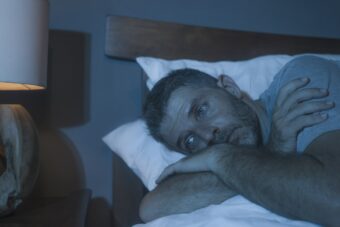We know healthy sleep is important. Good sleep enables us to manage stressful times in the short term, lowers our chance of developing persistent sleep problems in the longer term, and gives our immune system a boost.
Here are some tips to help get better sleep:
Daytime tips
Get up at the same time every day of the week. A regular wake time helps to set your body’s natural clock (circadian rhythm, one of the main ways our bodies regulate sleep). In addition to sleep, stick to a regular schedule for meals, exercise, and other activities. This may be a different schedule than you are used to, and that is okay. Pay attention to your body’s cues and find a rhythm that works for you and that you can maintain during this “new normal.” Make this a priority for all members of your household.
Get up, get out of bed, and get some light. Light is the main controller of the natural body clock, and regular exposure to light in the morning helps to set the body’s clock each day. Natural sunlight is best, as even cloudy days provide over double the light intensity of indoor lighting. If you are living in an area with shelter-in-place, try to expose yourself to natural light by stepping outside, at least a 2-metre distance from others, for at least 20 minutes.
Exercising during the day helps improve your sleep quality at night, reduces stress, and improves mood. Fit in exercise as best as you can. If you need to go outside for exercise, maintain proper social distancing at least six feet away from others. Avoid any group exercise activities, especially contact sports. Many gyms and yoga studios are now “at home” and offering virtual programs at low or no cost. Or try our yoga videos.
While the gravity of the pandemic certainly makes us all tired, try not to spend too much time in bed during the day, especially if you are having trouble sleeping at night. If you must take a nap, try to keep it short — less than 30 minutes and before 4pm so your sleep drive is not disturbed.
Nighttime tips
Avoid the news and ALL electronics at least one hour before bedtime. The non-stop news cycle seldom provides new information in the evening hours that you can’t wait until morning to hear, and will likely stimulate your mind or incite fear, making it harder to fall and stay asleep. Remind yourself by setting a timer or putting your television on the sleep setting. Make a pact with your family members to respect these parameters.
Cell phones, tablets, and all electronic devices make it harder for your brain to switch off, and the light (even dim light) from devices may delay the release of the sleepy hormone melatonin, which will interfere with your body clock by delaying sleep onset. If you need something to watch to help you unwind, watch something that you find relaxing on TV outside of the bedroom, then afterwards you can also curl up with a book or listen to relaxing music.
Limit coffee to before lunch as coffee takes a long time to get out of your system and may affect you getting off to sleep. Whilst alcohol can help people fall asleep, it leads to more sleep problems at night such as multiple awakenings which will fragment your sleep depriving you of the important healing deep sleep of stage.
There are certain times at night that your body will be able to sleep better than others. If you feel sleepy but your brain is busy thinking, it can’t shut off and go to sleep. It may be helpful to sit down with a pen and paper in the evening and write down the things that worry you; you can review this list in the morning and attend to any important concerns. If you have a bed partner, enlist their support to helping you stick to your schedule.
The evening and bedtime hours are also a good time to perform some relaxation techniques, such as simple stretching and relaxing breathing such as Dr Andrew Weil or see our advice on managing anxiety.
A place that is cool, dark, quiet, electronic and clutter-free.
Minimize spending time in bed in which you are not sleeping. If you are having trouble going to sleep or staying asleep, don’t stay in bed for more than 20 minutes. Get out of bed and do a quiet activity — read a book, journal, or fold some laundry.
Remember, don’t stress out about sleep!
Disrupted sleep is a normal response to stress, and it is okay to have a few nights of poor sleep as you adjust to new routines and big changes to your work and personal life. But with some simple measures you can preserve your sleep and improve your well-being during these uncertain times. We can’t control what’s happening in the world right now, but we can control some of our behaviour with regards to our sleep.

If you’d like to read more about getting a good night’s sleep, we’ve a news item called ‘Sleep Well During Shielding’ with more advice from Donna Fairley which you might like to see.
You might also find these of interest:
Counselling
We offer one-to-one counselling to people with vasculitis who need it. Don't suffer alone.
Get support
We offer a range of support services, including information, people to talk to, counselling and respite breaks.
Donate
Everything we do, and all the support services we offer, is made possible by donations. Please give if you can.